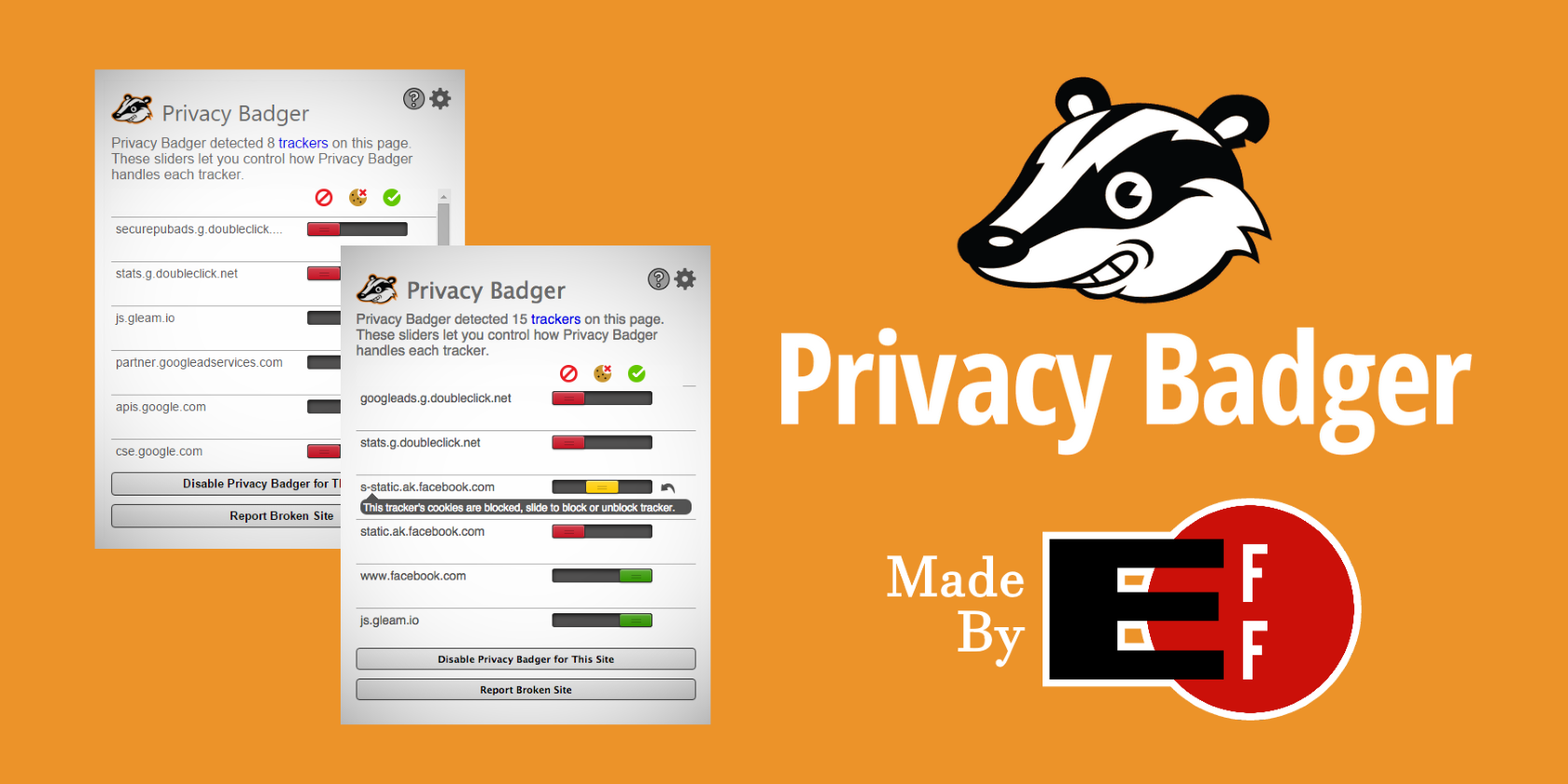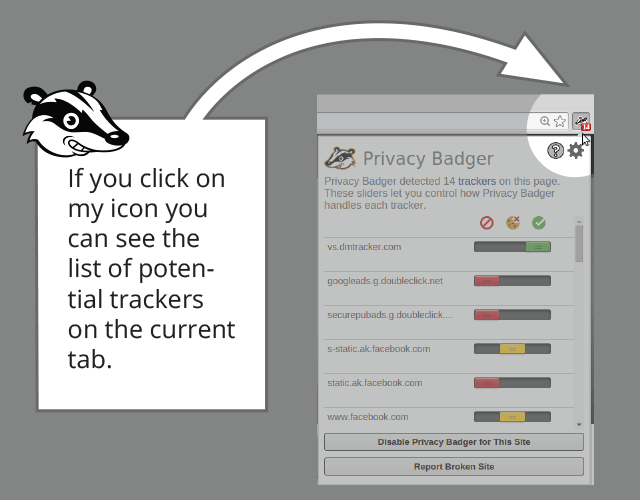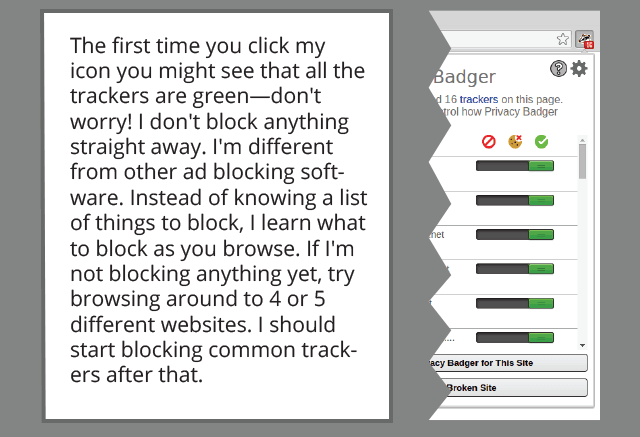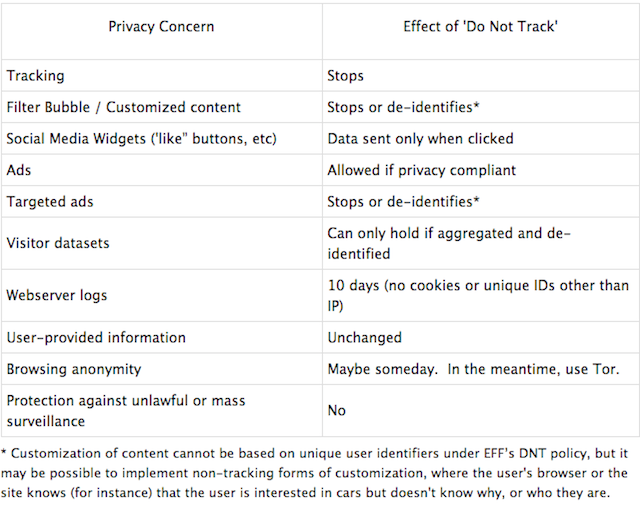Whether you know it or not, most websites you visit are slyly tracking you, sending private details, usage patterns, and other data about you to a far away server. It's a major privacy concern. Stop giving your data to untrustworthy sources with Electronic Frontier Foundation's new browser extension, Privacy Badger.
The silly name aside, Privacy Badger's aim is to be a silent protector for regular users, to the extent that you should never need to interact with it. Working in the background, its job is to guard your information from unintentionally being sent to advertisers and malicious third parties.
Download: Privacy Badger for Google Chrome
Download: Privacy Badger for Mozilla Firefox
(More desktop browsers are coming soon, along with Firefox Mobile)
What Does Privacy Badger Do?
When you are browsing, something like the social buttons on web pages can track you, sending that data to someone else. You never consented to this, but it's happening. Privacy Badger will identify such trackers and stop them from loading. It will also replace the social buttons with its own, safe social buttons. The rest of the website with its safe elements continues to work as normal.
In a nutshell: We've told you what cookies are and how you can manually disable them. Sometimes, that can break the page you want to see, or stop "good" cookies that enhance your web experience. Privacy Badger smartly disables only "harmful" cookies, and does its best to load the web page as is.
Privacy Badger also might block some ads, but that is not its purpose. It's a side effect of blocking tracking elements, so if an ad is trying to send your data back without your consent, the extension will eliminate those trackers as best as possible—sometimes, that results in the whole ad being blocked.
Do You Have to Do Anything?
On most occasions, no. Privacy Badger is meant to work in the background and is supposed to intelligently block trackers, learning as you use it more. However, sometimes it too will break a page in its zeal to protect you. When that happens, you will have to get involved.
Click the Privacy Badger icon and the menu will show you all the elements it has blocked or allowed in a page. You can drag the slider next to any element and set it to red (block completely) or green (allow completely). Privacy Badger also maintains a list of "yellow" elements, which are tracking you but are deemed by EFF to be essential to loading a page correctly. That said, the extension will do its best to stop third-party cookies and referrers from it.
Why Do You Need Privacy Badger?
Privacy Badger also uses EFF's recently launched Do Not Track (DNT) Policy, which is basically an agreement between web administrators and users to not track, retain and distribute private data, unless the user gives his consent. You can read a plain English version of what DNT means, the long legalese version, or just quickly find out if it's for you with this table:
Why Privacy Badger Over Existing Tools?
Privacy Badger isn't the first tool of its kind. We have covered the essential extensions to block tracking and scripts, featuring popular options like Ghostery, NoScript, Disconnect, and more. So what makes Privacy Badger special?
The biggest reason is that it is developed by the Electronic Frontier Foundation. The EFF is a non-profit organization dedicated to protecting digital rights of consumers. It takes on issues like government transparency, equal rights and laws, blogging and coding legal rights, privacy, and more. In essence, the EFF is the consumer's lobbyist for digital matters. In the FAQ section, it explains why it felt the need to develop Privacy Badger:
"Although we like Disconnect, Adblock Plus, Ghostery and similar products (in fact Privacy Badger is based on the ABP code!), none of them are exactly what we were looking for. In our testing, all of them required some custom configuration to block non-consensual trackers. Several of these extensions have business models that we weren't entirely comfortable with."
There is some truth to what they say. Ghostery kicked a hornet's nest a few years ago when users found it that its parent company, Evidon, sells user data to ad companies. Ghostery offers the necessary options to disable this from the user's side, but you need to actively do that; by default, you will be sending your data to Ghostery, which it can later sell. This conflict of interest has drawn criticism from privacy rights advocates [Broken URL Removed] in the past.
Similarly, NoScript is best to tackle JavaScript, which has severe privacy and security flaws. However, it can be aggressive in its blocking policies and end up breaking the web page you want to load.
Can You Trust the EFF?
The big question then is whether you can trust the EFF. It has some well-known and trustworthy names on its board, like security expert and privacy advocate Bruce Schneier. And yet, it came under heavy criticism for saying Dropbox has its users' backs. Dropbox was one of the companies named by Edward Snowden in the infamous NSA leaks, where he claimed they actively cooperated with the government.
So, we ask you: Do you trust the EFF over other companies, and is that reason enough to install Privacy Badger?





